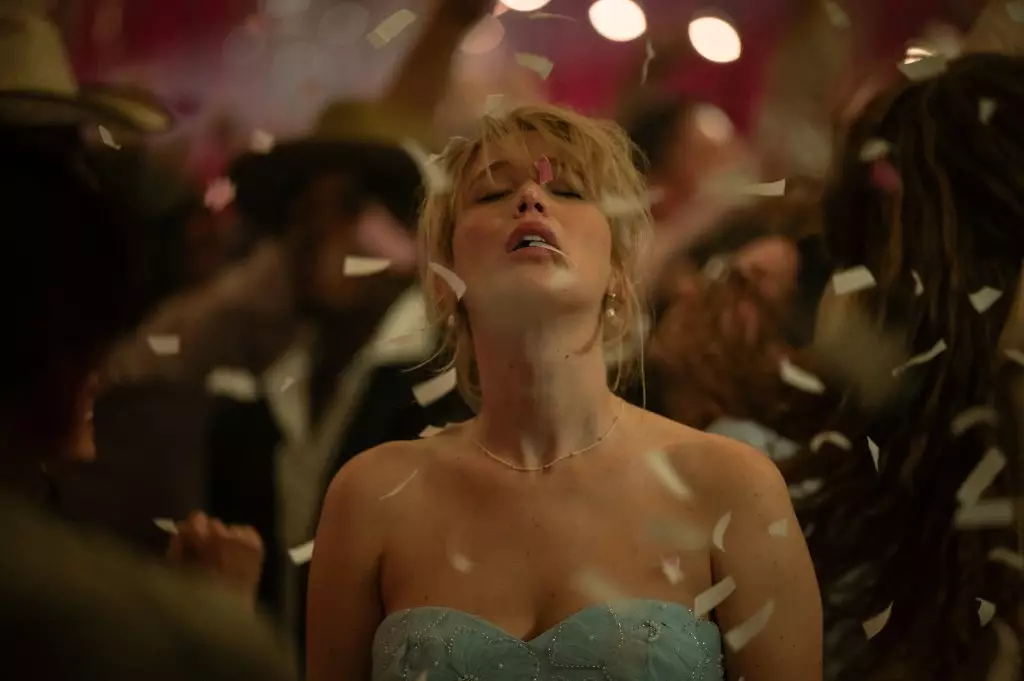The glitz and glamour of the Cannes Film Festival have always been a showcase for cinematic artistry, and this year, a particularly intense spotlight has fallen on *Die, My Love*. Helmed by the talented Lynne Ramsay and featuring an ensemble cast led by Jennifer Lawrence and Robert Pattinson, the film seeks to delve into the dark underbelly of postpartum depression. While festival premieres are often painted with a veneer of praise, can we dare to peel back the surface and truly evaluate what this film represents?
The red carpet was awash with star power, and many anticipated that Lawrence would claim the evening as her own. Critics fell over themselves to laud her performance, suggesting that her portrayal of Grace, a woman spiraling into the depths of despair, could very well lead to another Academy Award nomination. However, one must question whether this glorification of her performance may overlook some of the film’s more profound shortcomings.
A Story of Descent
*Die, My Love* is adapted from Ariana Harwicz’s novel and serves as an exploration of a married woman’s mental disintegration—a topic that is both poignant and troubling. Yet, amidst the heartfelt performances, one must ask whether the depiction of Grace’s mental state is overly sensationalized. Jennifer Lawrence, known for her compelling screen presence, embodies a performance rife with rage and vulnerability. But does this portrayal, praised as “unleashed,” drift too far into the realm of melodrama?
The film’s exploration of postpartum depression is undoubtedly vital in today’s discourse, yet its execution raises several flags. As articulated by *The Guardian*’s Peter Bradshaw, while she excels in a role defined by emotional chaos, the film’s narrative suffers from a lack of substance and direction. It’s one thing to capture the atmosphere of a nervous breakdown; it’s another to mold that disorienting experience into something your audience can connect with. Are we merely spectators to a “mood piece,” as the BBC describes it, rather than participants in a well-crafted narrative journey?
Critical Acclaim or Hasty Applause?
Instantly, reviews from *Indiewire* and *Vanity Fair* emphasized the gripping nature of Lawrence’s performance, branding it as Oscar-worthy. But is the fixation on awards credibly measured against the film’s overarching message? Yes, Lawrence steps into the role with all her might, showcasing her undeniable talent, but does that talent translate into a truthful representation of the psychological plight faced by many women postpartum?
Similarly, one has to question whether Ramsay’s direction is more about visual fervor than substantive understanding. The praise for her “super-strength direction” is intriguing; however, does a focus on style over substance serve the narrative? If a film deconstructs the mind of a woman yet fails to meet expectations for depth, it walks a dangerous tightrope. Variety’s critique of the film’s inclination to wallow in “violent dysfunction” without comprehensively exploring its implications rings true. Are audiences meant to be mere voyeurs in this harrowing tale, to watch a train wreck unfold without a glimmer of hope or understanding?
Navigating Feminist Themes in a Troubling Light
What’s particularly perplexing is the conversation around mental illness and female agency in *Die, My Love*. While it’s encouraging that such themes are brought to the forefront, the film risks reinforcing stereotypes surrounding women’s emotional breakdowns rather than breaking free from them. As we continue to grapple with feminist ideals in the film industry, does portraying women in perpetual chaos genuinely serve their story?
Ultimately, *Die, My Love* serves as a canvas filled with vibrant, but conflicting tones of mental distress. It is indeed a film of extremes, from the stellar performances to the assertions of raw realism. However, amidst the acerbate juxtapositions between accolades and critique, it leaves one pondering whether the portrayal of such emotional turmoil is truly a step forward, or simply a continuation of problematic tropes that have plagued cinematic narratives for far too long. The question remains: in spotlighting such profound despair, have we missed the opportunity to illuminate the strength nestled within recovery?


Leave a Reply